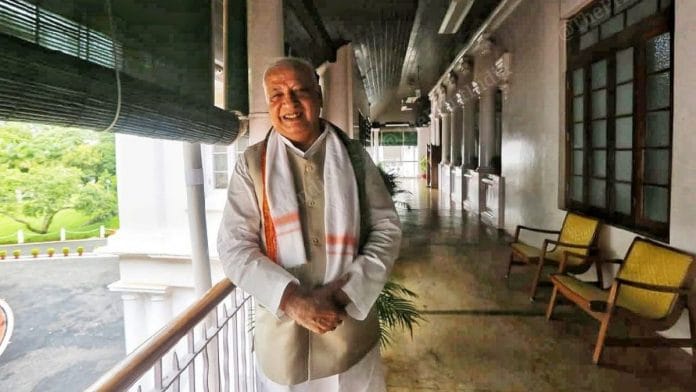New Delhi: Calicut University’s decision to make its graduating students sign an affidavit that they would not give or seek dowry may have drawn flak, but over the next few weeks, more Kerala universities are likely to walk the same path, Governor Arif Mohammed Khan told ThePrint.
The idea, Khan said, is to send a message that education is not “for raising the price of the bridegroom in the marriage market”.
“I had talked about the need to make interventions to stop the practice of dowry in a meeting of the 15 vice-chancellors of universities in Kerala, which is when one of them suggested that we could get students to sign this affidavit ahead of graduation and also make parents sign an affidavit at the time of admission that they would not give or seek dowry when their children are married,” Khan told ThePrint in an exclusive interview.
“Not just Calicut University, recently the Cochin Fisheries University too got 323 students to sign such an affidavit. On the 5th (October), there is the convocation of the Thrissur Medical University and on the 7th is the convocation of the Veterinary University of Wayanad,” he added. “In both these places the process has already started and there is a lot of enthusiasm among boys and girls.”
According to Khan, the vice-chancellors of both these universities have told him that there is a lot of enthusiasm among students on this.
It all started, Khan said, when he visited the family of Vismaya, a 24-year-old medical student who committed suicide in June, allegedly because of dowry harrassment by her husband’s family. Khan joined a fast on 14 July called by Gandhian organisations in the state against the practice. The next day, he called upon vice-chancellors to stamp out the evil.
“The idea of a message targeting students is because education is sometimes used to increase the price of a bridegroom in the marriage market. That is not the purpose of education,” he told ThePrint.
“Exchange of dowry is a crime, it is a question of moral turpitude, that is why the provision that if a person is found to be indulging in that, the university will have the right to withdraw the degree. Parents also need to be sensitised to not use their children’s education as a tool to demand dowry. There is a need to create awareness.”
Also read: How Kerala church’s ‘love jihad, narcotics jihad’ taunts are hurting Muslim businesses & society
‘Surprised by the opposition’
The affidavit has drawn opposition in Kerala, where activists and experts have said that it is “unconstitutional” and “bad in law”. Some have even said that a mere police complaint could deprive a student of a degree.
Khan was candid that the opposition had taken him by surprise. “You have to understand that a mere complaint against somebody in a police station would not mean that they forfeit their degree. Misgivings on that count are completely misplaced. The crime has to be established in a court of law before the question of degree revocation comes. I am surprised by the opposition. Is it their point that dowry is okay? Or are they presuming that every person gives or takes dowry?” he asked angrily.
He said that everywhere that he has visited since his staunch stance against dowry, he has been greeted with a lot of enthusiasm, especially by women.
“Kerala is a progressive state, there is 100 per cent literacy. It is a matrilineal society,” he said. “It is not acceptable that such a practice should continue in such a state. It is not acceptable anywhere.”
The idea is to implement the affidavit move in all 15 universities in the state, eventually, he said, adding that even the government of Kerala is moving in the same direction.
“On 16 July, the Kerala government asked all its employees to sign an affidavit that they would not give or take dowry,” he said “Violation could lead to disciplinary action, including dismissal. Anti dowry officers will be appointed in every district of the state.”
(Edited by Arun Prashanth)
Also read: CPM inducts Congress defectors in Kerala, in move away from insistence on ideological purity






